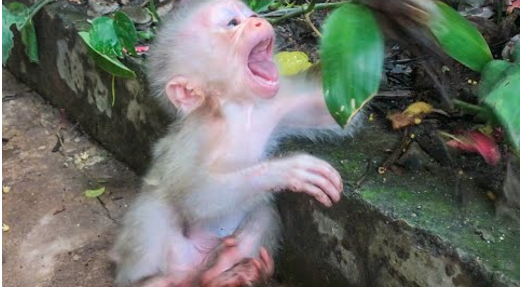Baby monkeys, like many young animals, are highly dependent on their mothers for safety, guidance, and learning essential survival skills. When a mother monkey is not around, her absence leaves the baby vulnerable to various accidents and dangers. This vulnerability can be attributed to several factors, primarily the inexperience and developmental stage of the baby monkey.
Firstly, baby monkeys lack the knowledge and experience that adult monkeys possess. They are still in the process of learning about their environment, potential threats, and how to navigate complex social structures. Without their mothers to guide and protect them, they are more likely to make poor decisions that can lead to accidents. For example, they may venture too far from the safety of their group, climb too high in trees, or interact with potentially dangerous animals.
Additionally, baby monkeys have not yet developed the physical skills and coordination that adult monkeys have. Their motor skills are still developing, making them more prone to falls and other mishaps. A mother monkey often helps her baby by carrying it, keeping it close, and ensuring it does not engage in risky behavior. When the mother is not present, the baby monkey’s limited physical abilities can result in accidents such as falling from trees or getting injured while trying to move around.
Social dynamics also play a significant role in the safety of baby monkeys. In many monkey species, mothers are not the only caregivers; other group members, such as older siblings or aunts, may also help look after the young. However, in the absence of these caregivers, a baby monkey can be left unsupervised, increasing the likelihood of accidents. The social structure of a monkey troop provides protection and learning opportunities for the young. When isolated, a baby monkey is deprived of this critical support system.
Furthermore, the natural curiosity of baby monkeys, while essential for their learning and development, can also lead them into dangerous situations. Without the watchful eye of their mothers, their explorations can result in encounters with predators, hazardous falls, or other harmful scenarios. A mother’s presence not only provides physical protection but also helps the baby monkey learn to recognize and avoid dangers through observation and imitation.
In summary, the absence of a mother leaves baby monkeys highly susceptible to accidents due to their inexperience, underdeveloped physical abilities, lack of supervision, and natural curiosity. The mother’s role is crucial in providing the necessary guidance, protection, and teaching for the baby monkey to navigate its environment safely and develop the skills needed for survival.
